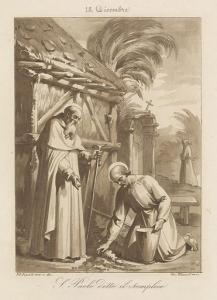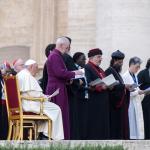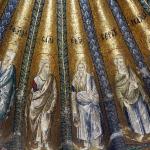
It is quite common for monastic communities, Christian or otherwise, to test strangers who want to join their community. They want to make sure any would-be monk would be able to follow the strict discipline expected by those within the community. There are many ways this test can be done. Sometimes, the would-be monk is insulted, with some reason or another given as to why they are not fit to join the community. This is done, not because they have been rejected, but to test their temperament, to see the kind of response they would give. If the person becomes easily agitated or irate, they do not possess the inner peace needed in order to be a member of the community, indeed, their inner strife could become disruptive and cause the community much turmoil. This, then, could be used to explain the kind of treatment St. Antony the Great gave St. Paul the Simple when Paul first came to him, asking to become a monk.
Paul had been a farmer all his life. He was, as his name indicated, a simple man, that is, not highly educated. But he was also a simple man in that he did not have great expectations for himself. Before becoming a monk, he had already learned to live a simple life, not seeking for worldly glory. In this fashion, his simplicity was a good thing, making him superior to many who thought themselves educated or wise and yet who did not know how to disengage from the world and all its contrivances, and so sought to pridefully show themselves off to the world by what they know.
Before deciding he should be a monk, he was a married man, but when he found his wife cheating on him, he decided it was best to move on, to let her be and do as she wanted, while he made his way out of secular society and became a monk. He was an old man when this happened, old enough that many would expect that he would seek a life of leisure instead of ascetism, a life which he earned for the decades of hard work. And yet, he felt, while it was time for a change, the change was to embrace a new vocation, starting his life over, as it were. He made his way into the desert, and found himself outside of Antony’s cell. He knocked on the door, and then, according to Palladius:
Antony came out and asked him: “What do you want?”
He said he wished to become a monk.
Antony said: “A man of sixty years, you cannot become a monk here. Go back to your village instead and work, live an active life, giving thanks to God. You would never endure the trials and tribulations of the desert.”
Again the old man replied: “I will do whatever you teach me.”
Anthony told him: “I have told you that you are an old man and cannot endure this life. However, if you really wish to become a monk, go to the community of brothers who can put up with your weakness. I live here alone, starving myself with five-day fasts.”[1]
It could appear that Antony was being ageist here; however, it is, in this instance, somewhat understandable that Antony might be concerned as to whether an elderly man could start their life over and follow the strict discipline expected of those living in the Egyptian desert community. However, again, it was a part of Antony’s test for him; he wanted to allow Paul confirm to himself, and to others, his resilience, that he would be capable of living out the harsh way of life found in the desert.
Paul endured. Indeed, it could be said that his years of hard labor as a famer likely gave him similar training and endurance that many monks received if they had become a monk in their youth. In this way, he would be like many other elderly men and women who lived in the desert, men like Antony himself, who had grown strong with experience and never lost that strength due to age. Thus, what Antony did could not and would not dissuade Paul:
These are the very arguments he used to scare Paul away. Since he was not going to put up with him, Antony closed the door and did not go out for three days, not even when necessary. But Paul did not go away.
On the fourth day Antony was compelled to go out. He opened the door and told him once more: “Old man, you must leave this place. Why do you bother me? You cannot remain here.”
Paul said:“ I cannot die anywhere else but here.”[2]
Recognizing Paul was not going away (and perhaps, he already knew that would be the outcome), Antony welcomed him into his cell, and continued to test him with regards to fasting and his humility. And, as he did so, Paul kept proving himself, indeed showing how his simplicity and former lifestyle made him a better monk than many others who came into the desert seeking to learn ascetic discipline from a young age. After fulfilling all the test given to him, Antony not only approved Paul’s entrance into the community, but said he was already a monk, worthy of his own cell. After being accepted in this fashion, Paul continued to embrace the way he had learned all his life; he continued to be humble, indeed, it was said that his humility allowed him to overcome the wiles of demonic powers which Antony himself found difficult to conquer.
The story of Paul the Simple is a story which resembles many other stories of would-be monks who had to prove themselves through the kind of difficulties put in their way before admitted into a monastic community. He, like so many others, found himself outside the community, awaiting approval from those within. Such approval is necessary for the community, as they need to make sure each would be monk comes with the right intention and with the abilities needed to meet those intentions. Paul would show himself to be superior to many others within the community, including, in some ways, Antony himself. Through his story, we should learn not to prejudge the elderly and what they are capable of doing. It also highlights the way of simplicity, one which lacks formal education, and the humility which follows from it, can be and is often greater than what is found in those who claim to be and appear wise but are incapable of living out the wisdom they have accumulated. Let us, therefore, take these lessons to heart, never judging the elderly and becoming ageist, nor the unlearned, thinking their ignorance disqualifies them from glory. For it is not education which brings glory, but Christ, who not only brings salvation but offers all kinds of grace to those who are willing to do what they need to do to integrate it in their lives.
[1] Palladius, The Lausiac History. Trans. Robert T. Meyer (New York: Paulist Press, 1964), 77.
[2] Palladius, The Lausiac History, 77.
Stay in touch! Like A Little Bit of Nothing on Facebook.
If you liked what you read, please consider sharing it with your friends and family!
N.B.: While I read comments to moderate them, I rarely respond to them. If I don’t respond to your comment directly, don’t assume I am unthankful for it. I appreciate it. But I want readers to feel free to ask questions, and hopefully, dialogue with each other. I have shared what I wanted to say, though some responses will get a brief reply by me, or, if I find it interesting and something I can engage fully, as the foundation for another post. I have had many posts inspired or improved upon thanks to my readers.













